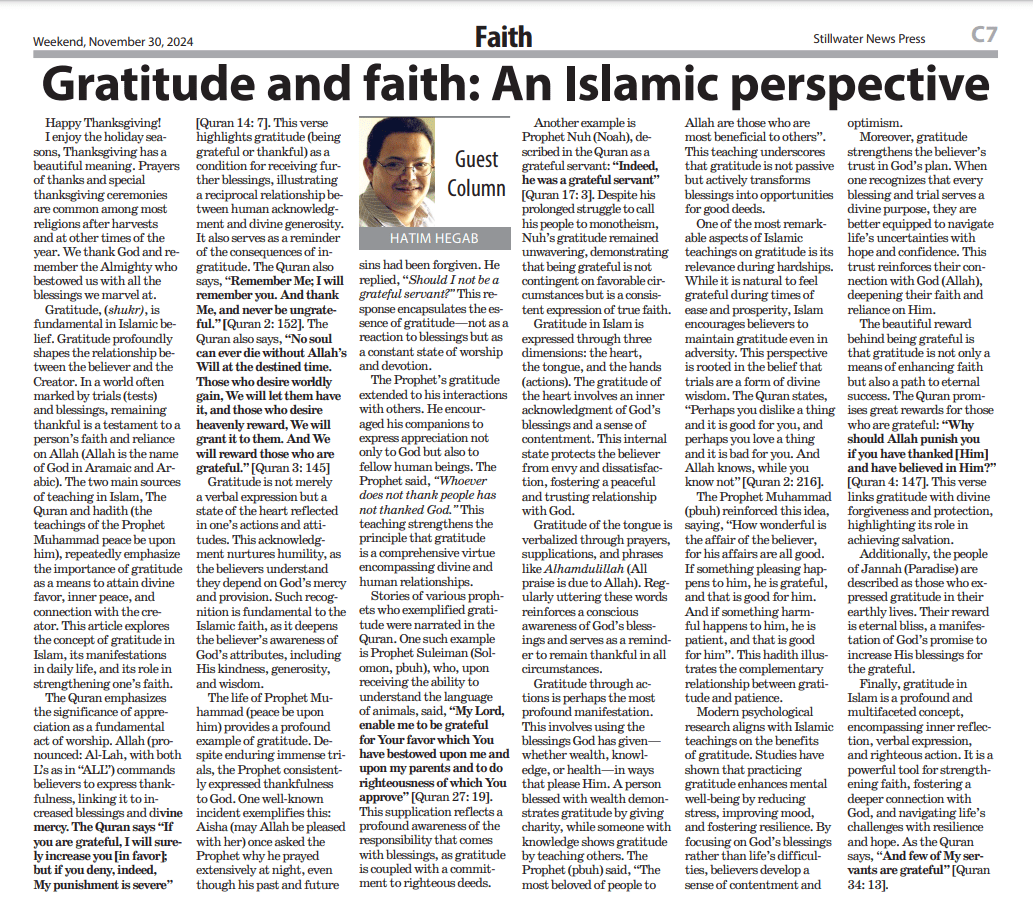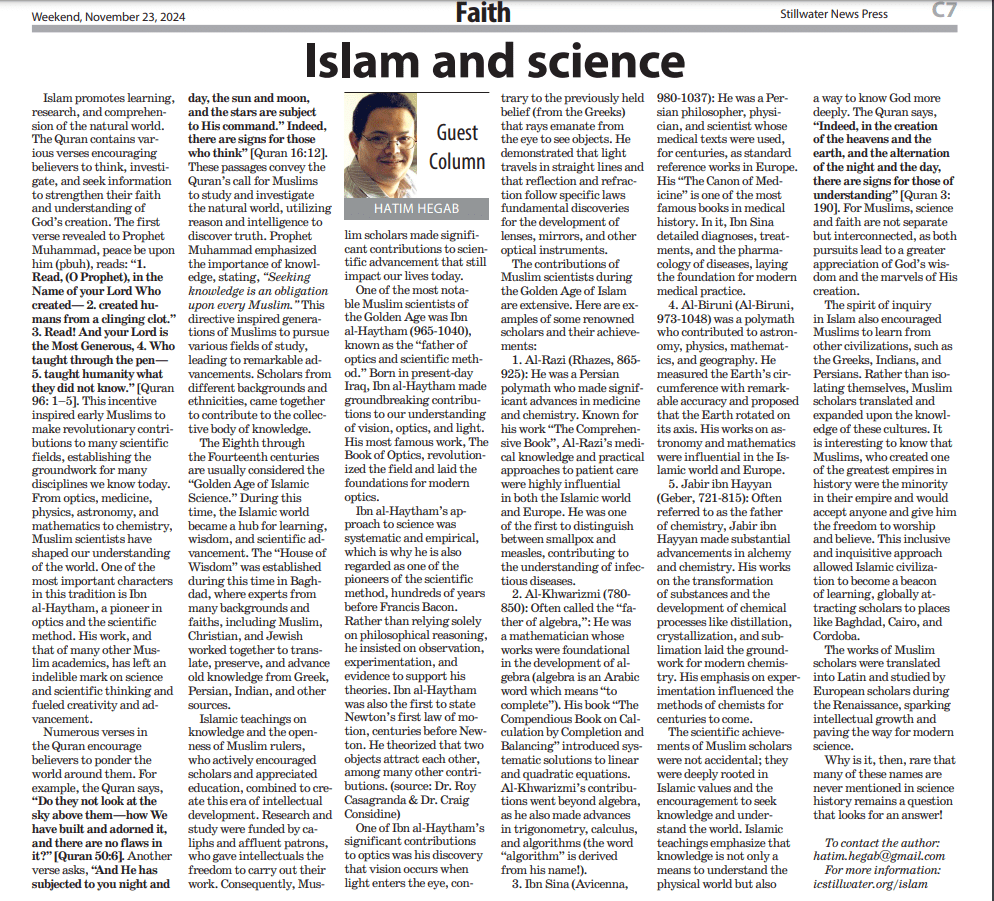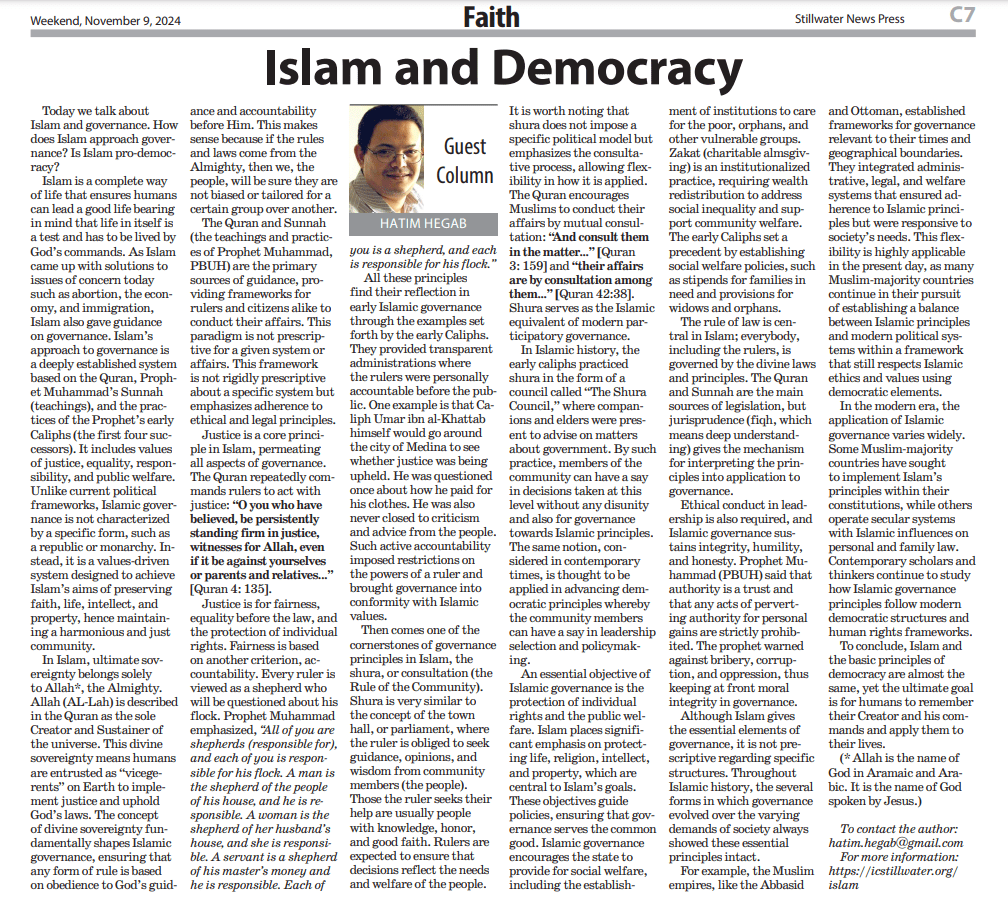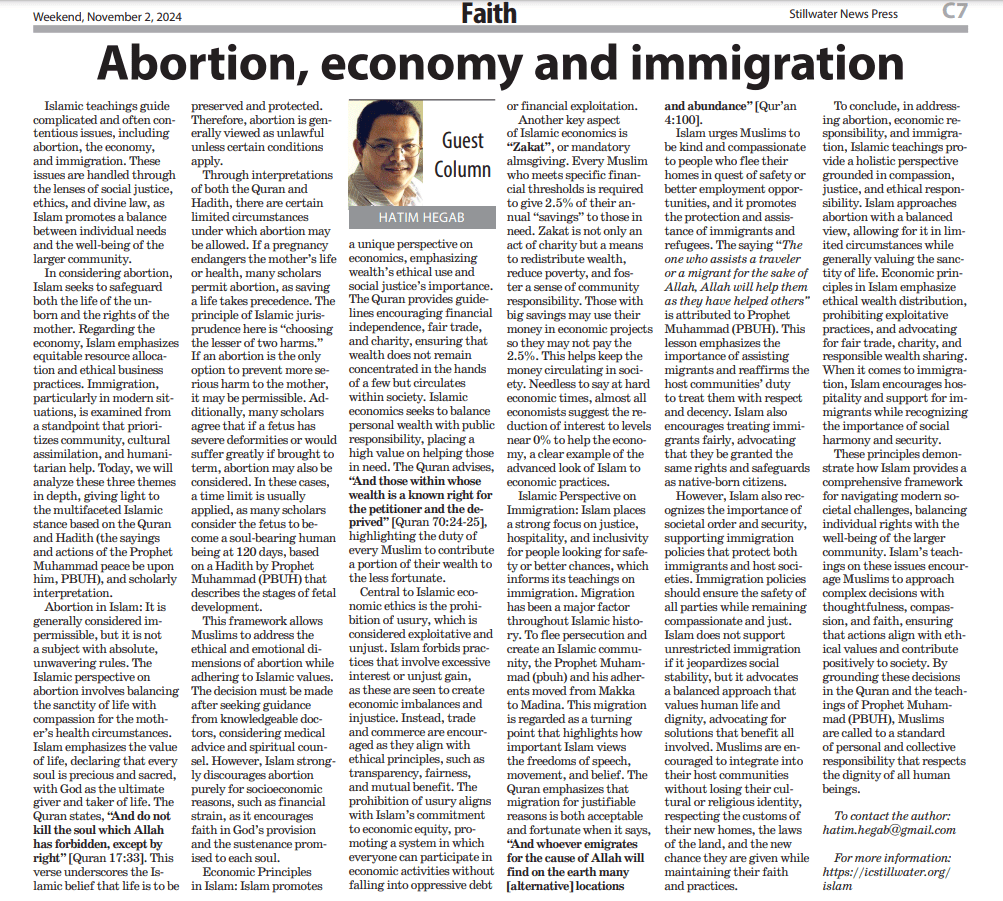11/28/2024 @ 2:29 pm
New Article Published
Dr. Hatim Hegab continues to contribute to the Faith page of the local newspaper, “The Stillwater News Press.” In his latest article, he talks about “Gratitude and Faith. An Islamic Perspective”:
For now, Dr. Hegab’s articles on political issues are not included in this list of his articles.
CLICK THE ARTICLE (IMAGE) TO VIEW OR DOWNLOAD A PDF COPY

11/21/2024 @ 12:29 pm
New Article Published
Dr. Hatim Hegab continues to contribute to the Faith page of the local newspaper, “The Stillwater News Press.” In his latest article, he talks about “Islam and Science”:
Islam and science have long shared a harmonious relationship, with the Quran encouraging reflection on the natural world to understand God’s signs. Islamic teachings view the pursuit of knowledge as a noble endeavor, with verses such as “Indeed, in the creation of the heavens and the earth and the alternation of the night and the day are signs for those of understanding” (Quran 3:190) urging believers to ponder the universe. This perspective laid the foundation for a golden age of scientific exploration during the medieval Islamic era, where scholars such as Al-Khwarizmi, Ibn Sina, and Al-Biruni made groundbreaking contributions to mathematics, medicine, and astronomy. Their integration of empirical observation with philosophical inquiry exemplifies Islam’s emphasis on using reason and evidence to seek truth.
The relationship between Islam and science continues to inspire modern dialogue, especially in areas like cosmology, biology, and environmental ethics. Islamic perspectives often align with contemporary scientific principles, emphasizing the interconnectedness of life and the universe. For example, the Quran describes embryonic development (Quran 23:12-14) and the expanding universe (Quran 51:47) reflecting modern scientific discoveries. Moreover, Islamic environmental teachings promote sustainability, recognizing humanity’s responsibility as stewards (Khalifah) of the Earth. This synergy between faith and science underscores Islam’s holistic worldview, where spiritual and intellectual pursuits coexist, fostering a deep appreciation for the natural world and its Creator.
For now, Dr. Hegab’s articles on political issues are not included in this list of his articles.
11/16/2024 @ 7:34 pm
New Article Published
Dr. Hatim Hegab continues to contribute to the Faith page of the local newspaper, “The Stillwater News Press.” In his latest article, he discusses “Islam and Faith”.
As a comprehensive way of life, Islam places immense emphasis on faith (Iman) as its foundation. Faith in Islam is not merely a passive belief but a dynamic conviction that shapes every aspect of a believer’s life. At its core, faith involves belief in the Oneness of Allah, His angels, His revealed books, His prophets, the Day of Judgment, and divine decree, both good and bad. These articles of faith form the spiritual framework that connects a Muslim to Allah and fosters a sense of purpose, accountability, and hope. Faith inspires Muslims to live ethically, seek knowledge, and contribute positively to their communities, knowing that their actions are ultimately part of a greater divine plan.
Moreover, faith in Islam is deeply personal yet universally inclusive, emphasizing the bond between the Creator and His creation. It is nurtured through acts of worship such as prayer, fasting, charity, and reflection on the signs of Allah in the world. Faith is not static; it grows with sincerity, humility, and good deeds. Islam teaches that true faith transcends mere ritual and manifests in compassion, justice, and service to humanity. This harmonious blend of belief and practice enables Muslims to navigate life’s challenges with resilience and trust in Allah, affirming that faith is both a source of inner peace and a guide for worldly success.
For now, Dr. Hegab’s articles on political issues are not included in this list of his articles.
11/09/2024 @ 11:29 am
New Article Published
Dr. Hatim Hegab continues to contribute to the Faith page of the local newspaper, “The Stillwater News Press.” In his latest article, he talks about “Islam and Democracy”:
Islam and democracy share core values, including justice, consultation, and equality, which form a foundation for harmonious coexistence. In Islam, the concept of shura (consultation) emphasizes the importance of involving the community in decision-making processes, similar to democratic ideals. Leaders are encouraged to seek the guidance and opinions of the people, aligning with democratic practices that give citizens a voice. Moreover, the principles of adl (justice) and public interest reinforce Islam’s commitment to governance that benefits society, protects rights, and ensures fair treatment—qualities central to a healthy democracy.
However, while Islam and democracy share similarities, there are distinct considerations regarding their application. In democratic systems, sovereignty often rests with the people, while in Islam, sovereignty belongs to God, and laws are derived from divine guidance. This framework can coexist with democratic values through mechanisms like constitutional frameworks that honor Islamic principles, while still allowing elected representatives and public participation in governance. Countries with Muslim majorities have demonstrated various models integrating Islamic values with democratic structures, showcasing diverse approaches to aligning faith and governance.
For now, Dr. Hegab’s articles on political issues are not included in this list of his articles.
11/02/2024 @ 4:39 pm
New Article Published
Dr. Hatim Hegab continues to contribute to the Faith page of the local newspaper, “The Stillwater News Press.” In his latest article, he discusses “Abortion, economy and immigration”.
in addressing abortion, economic responsibility, and immigration, Islamic teachings provide a holistic perspective grounded in compassion, justice, and ethical responsibility. Islam approaches abortion with a balanced view, allowing for it in limited circumstances while generally valuing the sanctity of life. Economic principles in Islam emphasize ethical wealth distribution, prohibiting exploitative practices, and advocating for fair trade, charity, and responsible wealth sharing. When it comes to immigration, Islam encourages hospitality and support for immigrants while recognizing the importance of social harmony and security.
These principles demonstrate how Islam provides a comprehensive framework for navigating modern societal challenges, balancing individual rights with the well-being of the larger community. Islam’s teachings encourage Muslims to approach complex decisions with thoughtfulness, compassion, and faith, ensuring that actions align with ethical values and contribute positively to society. By grounding these decisions in the Quran and the teachings of Prophet Muhammad (PBUH), Muslims are called to a standard of personal and collective responsibility that respects the dignity of all human beings.
For now, Dr. Hegab’s articles on political issues are not included in this list of his articles.



